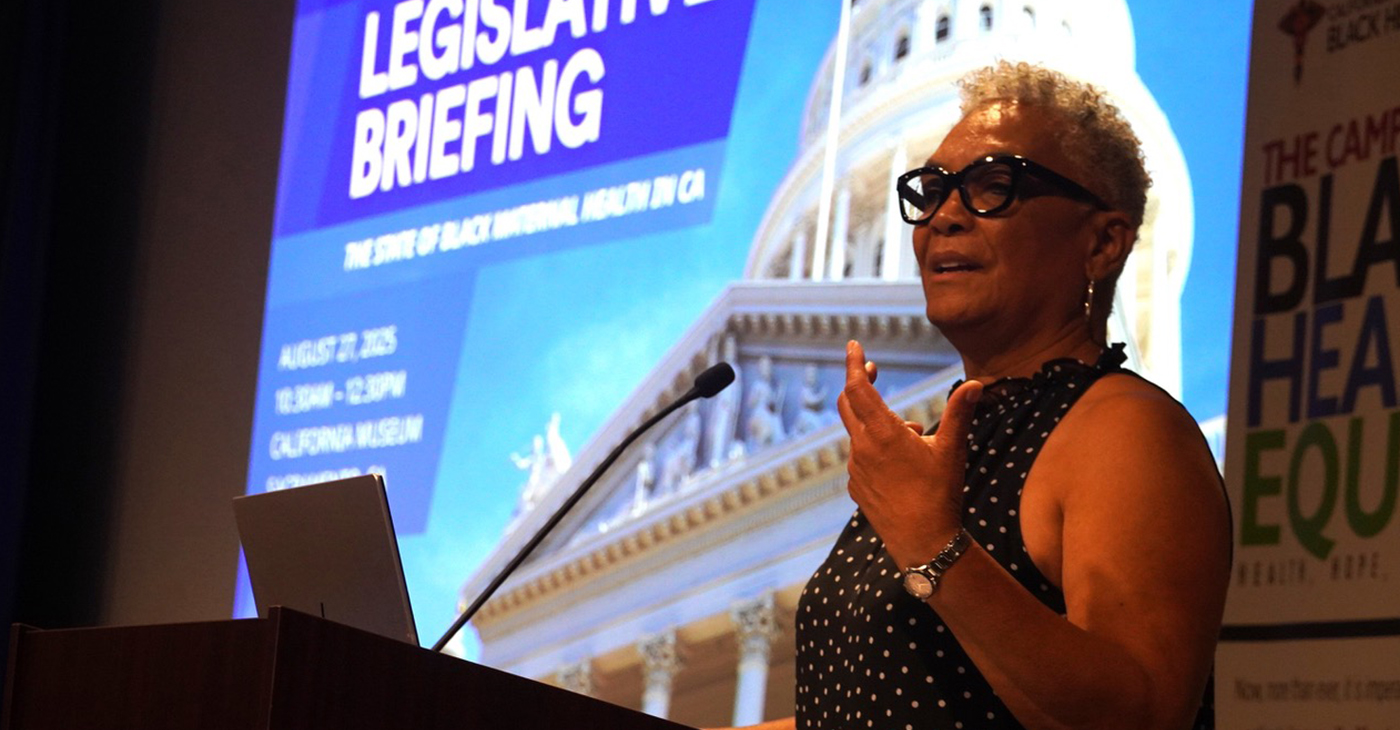Antonio Ray Harvey
New California Law Harshens Penalties for Trafficking Children for Sex
Senate Bill (SB) 14 — legislation that makes trafficking of a minor for purposes of a commercial sex act a serious felony — is now the law in California. Gov. Gavin Newsom signed the bill on Sept. 25 accompanied by First Partner Jennifer Siebel Newsom, State Sen. Shannon Grove (R-Bakersfield), who authored the bill, State Sen. Anna Caballero (D-Merced), as well as survivors and advocates.

By Antonio Ray Harvey
California Black Media
Senate Bill (SB) 14 — legislation that makes trafficking of a minor for purposes of a commercial sex act a serious felony — is now the law in California.
Gov. Gavin Newsom signed the bill on Sept. 25 accompanied by First Partner Jennifer Siebel Newsom, State Sen. Shannon Grove (R-Bakersfield), who authored the bill, State Sen. Anna Caballero (D-Merced), as well as survivors and advocates.
SB 14 classifies human trafficking as a serious felony, subjecting it to the state’s “Three Strikes” law, which imposes harsher penalties and sentencing enhancements for individuals convicted of the offense.
“Human trafficking is a sick crime. With this new law, California is going further to protect kids. I’m grateful for the leadership of Senator Grove, Speaker Robert Rivas (D-Hollister), and Pro Tem (Sen. Toni) Atkins (D-San Diego) in spearheading this bipartisan effort to make our communities and children safer,” said Gov. Gavin Newsom at the signing ceremony.
According to the U.S. Drug Enforcement Agency, “human trafficking involves the use of force, fraud, or coercion to obtain some type of labor or commercial sex act. Every year, millions of men, women, and children are trafficked worldwide.”
Advocates of SB 14 believe it will be a deterrent for the men and women who exploit children using the internet or force them into labor in red-light districts in major California cities such as the 5.7-mile stretch on Figueroa Boulevard in Los Angeles, Capp Street in San Francisco, International Boulevard in Oakland, Stockton Boulevard in Sacramento, Dalbergia Street in San Diego, and Wilson Way in Stockton.
“We got some stats and numbers from Figueroa from people that work in that area to rescue women and children,” Grove said at the State Capitol on Sept. 13. “They made comments that this bill disproportionately affects people of color … and it does. (SB 14) gives women and children an opportunity to be rescued and the perpetrator to be prisoned for many years.
The United States operates a national hotline, which serves as a platform for individuals to report suspected trafficking or seek assistance. According to data gathered from the hotline in 2015 through 2021, the number of people trafficking victims nationwide rose from 12,000 in 2015 to more than 22,200 in 2019 and then fell to 16,700 in 2021.
Public Policy Institute of California (PPIC), reports that from 2015 to 2021, the share of human trafficking cases involving sex trafficking increased from 87% to 89% in California, and from 85% to 88% nationally.
Statewide and nationally, sex trafficking is most common in pornography, massage parlors, and hotels. Among those trafficked for their labor, about 1 in 5 works in private homes, according to PPIC’s data.
SB 14 was hotly debated as it made its way through the legislative process this past summer. Some members of the California Legislative Black Caucus (CLBC), including Assemblymember Reggie Jones-Sawyer (D-Los Angeles), chair of the Assembly Public Safety Committee were the targets of threats and racial slurs for not initially supporting the bill.
Jones-Sawyer and other CLBC members on the Public Safety Committee — Majority Leader Assemblymember Isaac Bryan (D-Ladera Heights) and Assemblymember Mia Bonta (D-Alameda) — argued that that trafficking was already a crime under California law punishable by 15 years to life in prison. They argued that SB 14 was ineffective as a deterrent to the crime, and that it would perpetuate the poverty-to-prison pipeline.
Jones-Sawyer, who later voted to pass SB 14, said he was never against the bill, only parts of its language, which he deemed unacceptable because he felt it would cause more harm to trafficking victims rather than aid them.
A conviction under SB 14, including previous felonies, would increase prison sentences to 25 years to life. The trafficking of minors currently carries a prison term up to 12 years, or 15 years to life.
“We definitely thought there were a lot of merits to the bill, including how do we make sure these individuals are charged with serious felonies? We wanted to make sure that actually happens,” Jones-Sawyer told California Black Media. “It’s really about making sure that this doesn’t harm victims of human trafficking.”
SB 14, which passed the Assembly and Senate unanimously, is a bipartisan measure co-authored by 64 members of the Legislature. The legislation is supported by over 100 local, national and international organizations, including a coalition of human trafficking survivors and advocates.
Since 2019, California has taken a comprehensive approach to fight human trafficking. The state has invested a total of $280.1 million to dismantle trafficking networks and support victims and survivors, according to the Newsom administration.
The state has provided substantial funding to expand support programs for human trafficking survivors and Family Justice Centers — creating a one-stop facility for victims and their families to access various services — and allocated $25 million for the prevention, intervention, and services for minor victims of commercial sexual exploitation.
Newsom has signed several laws aimed at strengthening legal safeguards for victims of trafficking, including measures for vacating convictions and for considering trauma in determining sentences.
“The trafficking of young women and girls is a heinous crime with far too many victims,” Siebel-Newsom stated. “I’ve seen the pain survivors carry for a lifetime and having recently visited the infamous Figueroa sex trafficking corridor, I’ve witnessed the devastating impacts of these crimes — not just on girls and young women — but on entire communities when trafficking persists.”
Antonio Ray Harvey
$96 Million Allocated So Far to Black-Owned Firms as High-Speed Rail Project Expands Jobs, Boost Local Economies
Sen. Lola Smallwood-Cuevas (D-Los Angeles), a member of the California Legislative Black Caucus (CLBC) and Chair of the Senate Committee on Labor, Public Employment and Retirement, says the rail project “is exactly the kind of investment” California needs.

By Antonio Ray Harvey, California Black Media
As of May 31, the most recent data from the California High-Speed Rail Authority shows that 47 African American-owned firms are participating in the project as Disadvantaged Business Enterprises (DBEs).
A total of 936 Certified Small businesses are working on the high-speed rail program statewide, representatives of the high-speed rail project say.
The number of Black-owned DBE firms (5.2%) accounts for $96 million of the $1.136 billion allocated to minority firms thus far.
Sen. Lola Smallwood-Cuevas (D-Los Angeles), a member of the California Legislative Black Caucus (CLBC) and Chair of the Senate Committee on Labor, Public Employment and Retirement, says the rail project “is exactly the kind of investment” California needs.
Smallwood-Cuevas, speaking in Aug. 25 at the State Capitol Swing Space Annex — along with a coalition of Democratic state legislators and union leaders — provided an update on the California High-Speed Rail project and its efforts to employ people from the Black community and businesses.
“It builds a cleaner, more connected California while creating thousands of union jobs,” said Smallwood-Cuevas. “And we must ensure workforce equity, with pathways that open doors for workers who too often have been left out of good-paying careers.”
The remaining DBE minority-owned firms received the following amounts:
- Asian Subcontinent: 24 firms received approximately $65 million
- Asian-Pacific Islander: 52 firms received approximately $86 million
- Native American: 6 firms received approximately $39 million
- Hispanic/Latino: an unspecified number of DBE businesses received approximately $848 million
There are currently 328 certified DBEs participating in the project, according to the California High Speed Authority. The multi-billion-dollar project is billed to be committed to small, disabled, disadvantaged, and diverse businesses playing a major role in building the statewide high-speed rail project.
“As a Central Valley native, I know firsthand how transformative high-speed rail will be for our communities,” stated Assemblymember Lori D. Wilson (D-Suisun City) a member of the CLBC and Chair of the Assembly Transportation Committee.
“Stable and sustained funding is essential to delivering this project and fulfilling the promise made to voters.”
The news conference was hosted by Senate Transportation Chair, Sen. Dave Cortese (D-San Jose), who was promoting Senate Bill (SB) 545. He and the California High-Speed Rail Authority (CHSRA) urged the Legislature to commit to a steady, annual investment from a cap-and-trade program to fund the high-speed rail project.
Dr. Melanie Okoro, the Principal and Chief Executive Officer of Eco-Alpha, attended the briefing. Eco-Alpha is a Sacramento-headquartered small, women-owned, minority-certified firm.
The company, not classified as a DBE, earned its status as a certified small business and a certified women-minority small business through the California Public Utilities Commission (CPUC) and the Department of General Services (DGS). The certification allowed Eco-Alpha to be featured by CHSRA as a small business working on the project.
The Black-owned firm provides engineering and environmental services to the California High-Speed Rail project, primarily focused on facilities operation and Maintenance.
Okoro said laborers are not the only workers benefiting from the project. Professionals of color in engineering, with specialized knowledge and problem-solving skills to design, build, and maintain a wide array of structures, systems, and products, are looking forward to these “great opportunities.”
Activism
Sacramento: Lawmakers Hear From Health Advocates on “State of Black Maternal Health”
Participants highlighted several past and current bills going through the state Legislature that focus on improving maternal health equity. The proposals address systemic inequities to improve the healthcare experiences of Black women during pregnancy, labor, and postpartum.

By Antonio Ray Harvey, California Black Media
Adjoa Jones is a Los Angeles-based health and community leader who has dedicated her career to advocating for equitable birth outcomes for Black mothers and infants.
Participating in a legislative briefing hosted by the California Black Health Network (CBHN) on Aug. 27, Jones shared stories that shed light on the disproportionately high rate of pregnancy-related complications and deaths among Black women.
Two Black women in Southern California, Jones says, suddenly passed away after giving birth. From Jones’s perspective, those maternal mortalities could have been prevented.
“I come to you speaking from the voices of our community. From the stories of two unforgettable mothers, but it really speaks to the most preventable tragedies,” said, Jones, who is the Director of African American Infant and Maternal Mortality Prevention Initiative at the L.A. County Department.
“It’s not just impacting California, but our nation far and wide,” Jones added during the event titled “The State of Black Maternal Health” and held at the California State Museum in Sacramento.
Participants highlighted several past and current bills going through the state Legislature that focus on improving maternal health equity. The proposals address systemic inequities to improve the healthcare experiences of Black women during pregnancy, labor, and postpartum.
Panelists included Sandra Poole, Health Policy advocate for the Western Center on Law and Poverty, and Brittany Chambers, Associate Professor for the Department of Human Ecology at the University of California at Davis.
Other panelists were Palav Babaria, Deputy Director for the California Department of Health Care Services, and Zea Malawa, Director of Expecting Justice.
Rhonda Smith, the Executive Director of CBHN, served as the host and moderator of the briefing.
“There are amazing and incredible women who are doing amazing work here in the state,” Smith said of the panelists who discussed potential policy solutions and accountability.
During Jones’ presentation, she shared the tragic stories of two women. One was April Valentine, who died on Jan. 10, 2023, after giving birth at Centinela Hospital Medical Center in Inglewood.
According to reports, Valentine died from a blood clot, a pulmonary embolism, that formed in her leg and circulated to her lung. A well-known complication during pregnancy. Valentine’s family members said her condition was preventable, and they filed a wrongful-death claim.
The second woman, 32-year-old Briget Cromer, died in 2023 at California Hospital Medical Center, hours after giving birth to her fifth child. Her family believes her death was due to medical negligence.
Her family’s legal team filed a formal complaint with the U.S. Department of Health and Human Services (USDHH) alleging systemic racial bias in care.
According to the California Department of Public Health, Black women are more likely than their counterparts to die during pregnancy. They represent 5% pregnancies in the state but account for 21% of pregnancy-related deaths.
“We’re doing all that we can to ensure that pregnancy is uplifted (and) pregnancy is a place that’s where folks can enjoy the journey, Jones said.
Sen. Akilah Weber Pierson (D-San Diego), an obstetrician-gynecologist, was the keynote speaker.
“Here in California, we tragically lose another mother due to pregnancy-related complications every five days,” Weber Pierson said. “Here and nationally, Black mothers are three to four times likely to be one of those mothers lost. That’s coming from 40% of maternal deaths.”
Antonio Ray Harvey
Air Quality Board Rejects Two Rules Written to Ban Gas Water Heaters and Furnaces
The proposal would have affected 17 million residents in Southern California, requiring businesses, homeowners, and renters to convert to electric units. “We’ve gone through six months, and we’ve made a decision today,” said SCAQMD board member Carlos Rodriguez. “It’s time to move forward with what’s next on our policy agenda.”

By Antonio Ray Harvey
California Black Media
Two proposed rules to eliminate the usage of gas water heaters and furnaces by the South Coast Air Quality Management District (SCAQMD) in Southern California were rejected by the Governing Board on June 6.
Energy policy analysts say the board’s decision has broader implications for the state.
With a 7-5 vote, the board decided not to amend Rules 1111 and 1121 at the meeting held in Diamond Bar in L.A. County.
The proposal would have affected 17 million residents in Southern California, requiring businesses, homeowners, and renters to convert to electric units.
“We’ve gone through six months, and we’ve made a decision today,” said SCAQMD board member Carlos Rodriguez. “It’s time to move forward with what’s next on our policy agenda.”
The AQMD governing board is a 13-member body responsible for setting air quality policies and regulations within the South Coast Air Basin, which covers areas in four counties: Riverside County, Orange County, San Bernardino County and parts of Los Angeles County.
The board is made up of representatives from various elected offices within the region, along with members who are appointed by the Governor, Speaker of the Assembly, and Senate Rules Committee.
Holly J. Mitchell, who serves as a County Supervisor for the Second District of Los Angeles County, is a SCAQMD board member. She supported the amendments, but respected the board’s final decision, stating it was a “compromise.”
“In my policymaking experience, if you can come up with amended language that everyone finds some fault with, you’ve probably threaded the needle as best as you can,” Mitchell said before the vote. “What I am not okay with is serving on AQMD is making no decision. Why be here? We have a responsibility to do all that we can to get us on a path to cleaner air.”
The rules proposed by AQMD, Rule 1111 and Rule 1121, aim to reduce nitrogen oxide (NOx) emissions from natural gas-fired furnaces and water heaters.
Rule 1111 and Rule 1121 were designed to control air pollution, particularly emissions of nitrogen oxides (NOx).
Two days before the Governing Board’s vote, gubernatorial candidate Antonio Villaraigosa asked SCAQMD to reject the two rules.
Villaraigosa expressed his concerns during a Zoom call with the Cost of Living Council, a Southern California organization that also opposes the rules. Villaraigosa said the regulations are difficult to understand.
“Let me be clear, I’ve been a big supporter of AQMD over the decades. I have been a believer and a fighter on the issue of climate change my entire life,” Villaraigosa said. “But there is no question that what is going on now just doesn’t make sense. We are engaging in regulations that are put on the backs of working families, small businesses, and the middle class, and we don’t have the grid for all this.”
Rules 1111 and 1121 would also establish manufacturer requirements for the sale of space and water heating units that meet low-NOx and zero-NOx emission standards that change over time, according to SCAQMD.
The requirements also include a mitigation fee for NOx-emitting units, with an option to pay a higher mitigation fee if manufacturers sell more low-NOx water heating and space units.
Proponents of the proposed rules say the fees are designed to incentivize actions that reduce emissions.
-

 Activism3 weeks ago
Activism3 weeks agoOakland Post: Week of November 12 – 18, 2025
-

 Activism3 weeks ago
Activism3 weeks agoIN MEMORIAM: William ‘Bill’ Patterson, 94
-

 Activism3 weeks ago
Activism3 weeks agoHow Charles R. Drew University Navigated More Than $20 Million in Fed Cuts – Still Prioritizing Students and Community Health
-

 Bay Area3 weeks ago
Bay Area3 weeks agoNo Justice in the Justice System
-

 #NNPA BlackPress3 weeks ago
#NNPA BlackPress3 weeks agoThe Perfumed Hand of Hypocrisy: Trump Hosted Former Terror Suspect While America Condemns a Muslim Mayor
-

 #NNPA BlackPress2 weeks ago
#NNPA BlackPress2 weeks agoTrump’s Death Threat Rhetoric Sends Nation into Crisis
-

 #NNPA BlackPress4 weeks ago
#NNPA BlackPress4 weeks agoProtecting Pedophiles: The GOP’s Warped Crusade Against Its Own Lies
-

 #NNPA BlackPress2 weeks ago
#NNPA BlackPress2 weeks agoLewis Hamilton set to start LAST in Saturday Night’s Las Vegas Grand Prix


























































